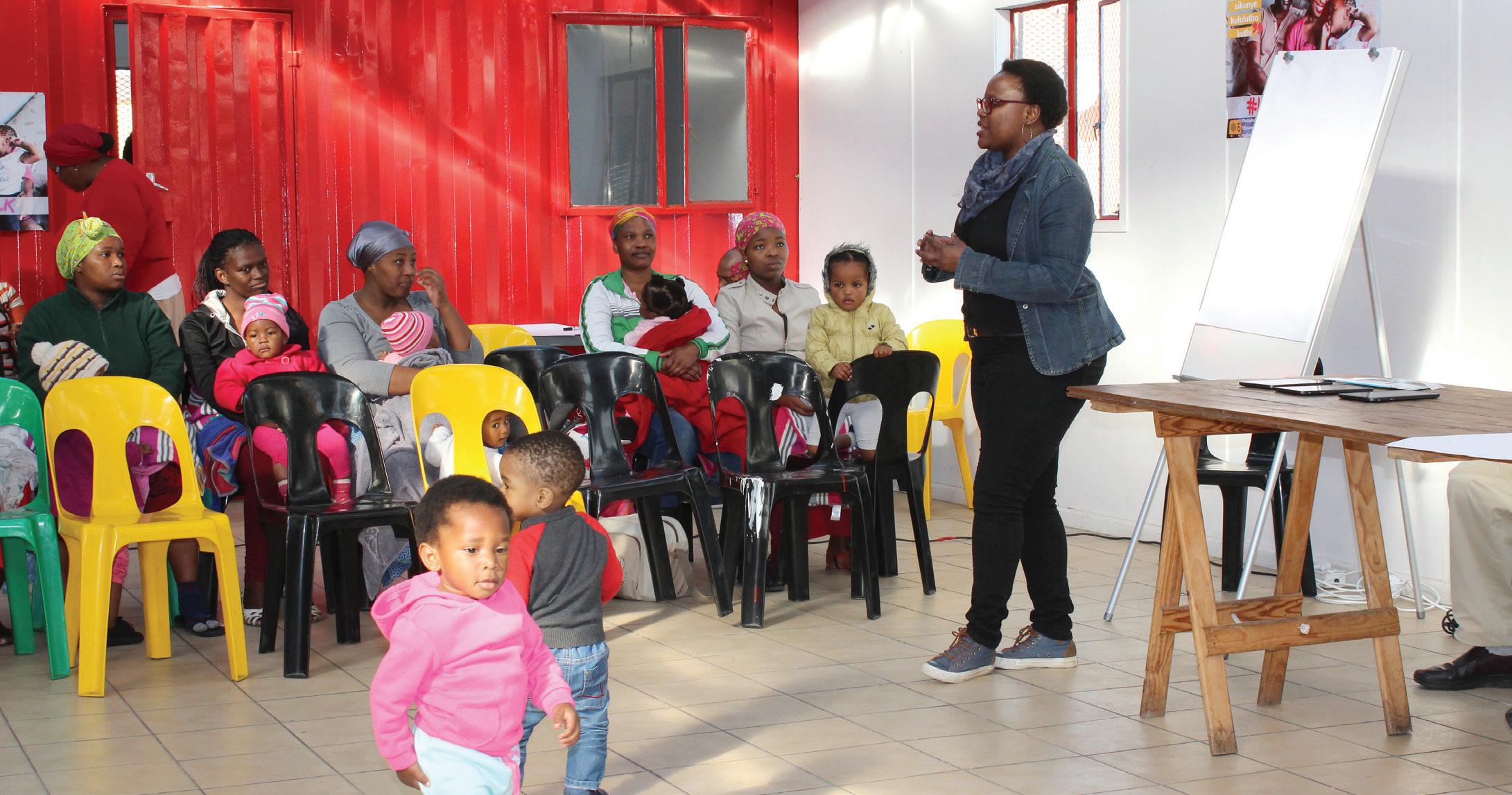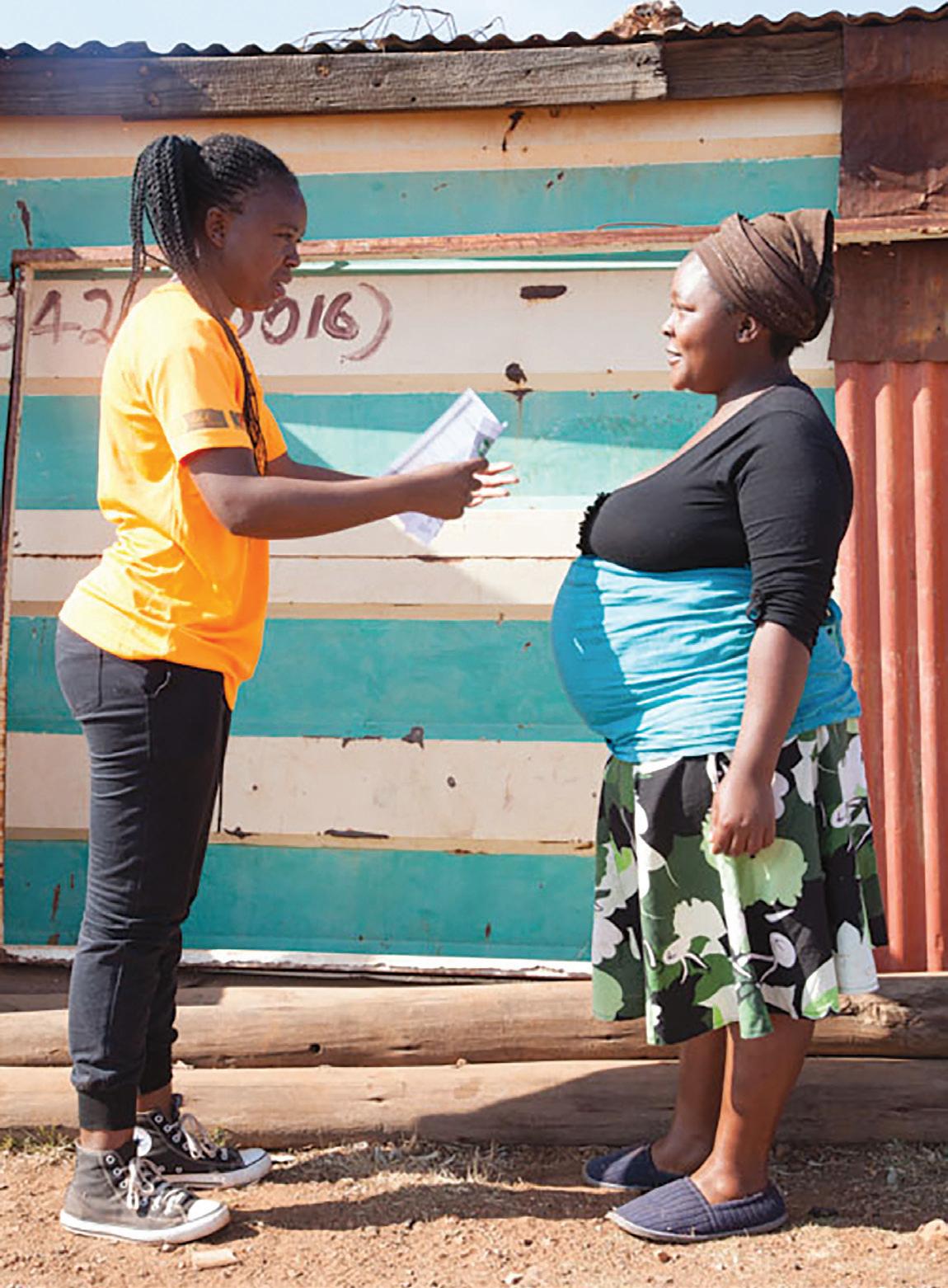










FIVE-YEAR
Quality early childhood development for all children that also supports caregivers, creates sustainable livelihoods for women, and builds an equitable and prosperous South Africa.
Ilifa Labantwana works towards a South Africa where everyone contributes to children reaching their full potential. We use our technical expertise and deep understanding of government, alongside evidence, collaboration, and advocacy to strengthen the early childhood development ecosystem.
Ilifa improves the ECD ecosystem to enable all stakeholders to play a role in securing quality ECD services for all children and their caregivers, whilst also allowing the womenled care economy to thrive. We play multiple roles in this process:
We have deep contextual knowledge of public administration and financing. Armed with this expertise we support government and our partners to make the systems for delivering ECD services simpler, fairer, and more effective. We offer technical guidance on policy, programming, planning, and financing. When we hit roadblocks, we innovate and test new routes to our destination.
We see linkages between seemingly unrelated sectors, government departments, and processes. We analyse how their respective systems can interact and we create connections – all with the goal of expanding funded quality ECD services.


We understand that to go further, we must go together. We participate in, and occasionally initiate and guide, cross-sector partnerships that strengthen our shared impact. We are continually learning from these collaborations to generate knowledge and evidence, which we share freely.
We advocate for a fairer operating environment for all ECD stakeholders by equipping them with the knowledge, information, and tools they need to hold government accountable and drive change.
Early childhood development (ECD) is a period of intense physical, mental, and socio-emotional development that takes place from conception until age six. When children benefit from quality ECD, they thrive. They start school ready to learn and, as adults, participate fully in social and economic life. Children who benefit from quality ECD have the potential to build a society where wealth is shared by all. Countries that invest in ECD ultimately see improved economic growth, labour market productivity, and public health savings.
Expanding quality ECD services and support to all children and their caregivers is an opportunity to catalyse human capital formation in the short-term as well. The first step being that children are developmentally ready for formal schooling from Grade R. An expansion in ECD services will boost the women-led care sector and allow caregivers to work or look for work. ECD is central to South Africa’s long-term socio-economic development.
Children’s early development is a function of five interrelated and integrated packages of services and support covering the period from conception to six years of age:
1. Maternal, newborn and child health services,
2. Nutritional support,
3. Support for primary caregivers,
4. Social services and protection,
5. Quality early learning programmes.
Collectively, these are the Essential Package of ECD services and support, and because they are essential, they need to be accessible to all young children and their caregivers without any barriers such as costs. All children born in South Africa have rights to survival, health, adequate nutrition, protection, and development. These rights are protected in the highest law of our land, the Constitution, and in international law. The Essential Package is a necessary precondition to realise children’s constitutional rights.
The Essential Package comprises of services and support not only for children, but also for pregnant women and children’s caregivers. They need support so that they can provide for all aspects of their children’s development in the home.
Delivering the Essential Package requires collaboration. Because young children and their caregivers have a broad range of needs that are interdependent, multiple stakeholders should be involved in service delivery. It is important to have good collaboration and referrals between stakeholders.
Our strategy identifies seven strategic goals in the ECD ecosystem that can accelerate access to the Essential Package for all, while respecting the multiplicity of approaches to achieving this. These goals guide us to our vision for an equitable and prosperous South Africa, built on quality ECD services for all children and their caregivers, as well as a women-led care economy.
Our destination is a South Africa where all children, caregivers, and pregnant women benefit from the Essential Package; while the ECD workforce (mostly women) are upskilled and earn sustainable livelihoods. The table below maps out this journey.

• All children are developmentally on track by the time they start Grade R in terms of physical growth and development, socio-emotional functioning, and cognition.
• Women in the care economy shift from unskilled to semi-skilled increasing their income-earning potential.
• The employment rate for women increases, and the gender employment gap reduces.

3.4mn of the poorest children aged 0-5 attend a registered and subsidised ELP.
797,000 of the most vulnerable children aged 0-2 and their families are reached through home-visiting programmes.

544,000 ELP staff work across 168,000 ELPs in South Africa.
60,000 CHWs reach the most vulnerable children through home visiting programmes.
2.1mn of the poorest children aged 0-5 attend an ELP, 1mil of them are subsidised.
330,000 of the most vulnerable children aged 0-2 are reached through home visiting programmes.
295,000 ELP staff work across 68,000 ELPs in South Africa.
205,000 ELP staff will receive skills training.
7,700 CHWs are trained and resourced as Grow Great Champions.


2mn women caregivers are able to participate in the labour market.
Parenting support media reaches 10mn caregivers per week.
Income support available to 1mn vulnerable pregnant women.
1.3mn women caregivers are able to participate in the labour market.
Parenting support media. reaches 10mn caregivers per week.
Government’s annual allocation to support early learning and home visiting is R37bn.
R2.3bn allocated annually for income support to pregnant women.
Government increases its annual allocation to support early learning and home.
visiting to R8.4bn.
Government spends R7.4mn on caregiver communication campaigns.
South Africa’s poorest children and their caregivers do not receive the extra care they need in the first 1000 days, or quality early learning opportunities. Less than half of 0–5-year-olds have access to an ELP; of those that do, 57% start school without the right foundations in place.1 South Africa is missing out on the economic and social development benefits of investing in a women-led care economy.
1.7mn of the poorest children aged 0-5 attend an ELP, 625,000 are subsidised.
Some vulnerable children aged 0-2 receive homevisiting programmes, but we don’t know how many.
224,000 ELP staff work across 49,000 ELPs in South Africa.
50,000 CHWs conduct home visits.
1.1mn women caregivers are able to participate in the labour market. Survey data shows that 22% of women not in education, employment or training are inactive because of caregiving responsibilities.2 Parenting support media. reaches 4.3mn caregivers per week.
Government spends R3mn on the Side-by-Side ECD communication campaign targeted at caregivers.

Our government must realise the right to ECD. All children and caregivers must be able to access the full Essential Package. There should be no barriers to access and caregivers who cannot afford to pay for services and support must be funded by the government. There should be no barriers to access and caregivers who cannot afford to pay for services and support must be funded by the government. Access to the Essential Package is currently unequal with some key components such as income support for pregnant women not being in place. Expanding access to the Essential Package is just as important for women as it is for children, offering plentiful opportunities to upskill and create income-earning opportunities. All of society, caregivers included, should be empowered to hold government accountable to this obligation.
OUR STRATEGY: Generate knowledge and support advocacy to hold government accountable for ECD.
• WHERE WE WILL FOCUS OUR EFFORTS:
• Generate evidence to establish public consensus that ECD is a key contributor to growing South Africa’s human capital – both in terms of (1) children’s development and (2) the income-generating potential that childcare and ECD jobs offer women. We will do this through a collaborative approach that draws on expertise and data generated by our partners.
• Led by the Grow Great Campaign, undertake community nutrition surveys and publish stunting scorecards to advocate for zero-stunting.
• With the Equality Collective, develop a strong legal case for the Right to ECD.
• Use the Real Reform for ECD movement to mobilise the ECD sector to demand that government delivers on its obligation to expand access to the Essential Package for all.
• With the Grow Great Campaign, advocate for vulnerable pregnant women to receive income support, while also calling on government to ensure that children are registered to receive the Child Support Grant (CSG) from birth.
• Engage in platforms for accountability and partnership between government and civil sector, such as the ECD Inter-sectoral Forum and the Budget Justice Coalition.

South Africa’s poorest children and their caregivers do not receive the extra care they need in the first 1000 days, nor quality early learning opportunities. Less than half 0-5 year olds have access to an early learning programme, and of those that do, 57% fail to thrive and meet their full potential. South Africa is missing out on the economic and social development benefits of investing in a women-led care economy.







Mobilised sector and accountable government




Effective delivery






delivery systems



All children thrive by the time they start school because they have access to extra care in the first 1000 days if they need it and can attend quality early learning programmes. The South African care economy offers skilled livelihood opportunities for the women-led ECD workforce across the ECD Essential Package while women caregivers can participate in the workforce knowing their children are in safe early learning spaces.



Coordinated, collaborative and cohesive ECD service delivery model



Government must take responsibility for the planning, coordination, and funding of universal access to the Essential Package, and work towards a branded programme of action that will facilitate mutual accountability. All levels of government whose actions affect ECD must (1) plan together, and (2) collaborate with civil society to identify the optimal mix of services at local level. Making ECD “everyone’s” business will allow for the maximisation of resources both within the public sector and externally.
OUR STRATEGY: Build effective partnership models for civil society to work with government to accelerate delivery and support government’s capacity to plan and coordinate ECD.
• Advocate for and support the development of a branded programme of action for children so that all of society is clear on South Africa’s commitments to ECD.
• Work with core partners to build and institutionalise formal public-private partnerships that position civil society as a key contributor to the expansion of ECD services and support. These partnerships will allow the state to leverage a range of expertise, funding, and programmes that can bring South Africa closer to universal ECD access, while growing the women-led care economy at the same time.
• Assist the Department of Basic Education (DBE) to build sufficient capacity to lead on the planning and coordination of ECD services, as well as the design of a coordinated, collaborative, and cohesive ECD service delivery model.
• With Kago Ya Bana, support the Department of Cooperative Governance and Traditional Affairs (CoGTA) to develop ECD municipal guidelines and to prioritise their adoption in the District Development Model pilot sites.


We need simpler and fairer regulations that recognise the value of informal ELP provision and enable women who are starting up or running ELPs informally to register with government and access subsidies and quality oversight interventions. An enabling environment with simplified norms and standards will encourage more women to become ELP providers and thereby increase the supply of ELPs. Given that infrastructure related norms and standards are a common barrier to registration, innovative approaches to infrastructure must be developed. A reformed regulatory environment must be accompanied by an efficient registration system that supports ELPs throughout.
OUR STRATEGY: Rebuild a more inclusive regulatory environment that enables the womenled care economy to flourish. and coordinate ECD.
WHERE WE WILL FOCUS OUR EFFORTS:
• Propose regulatory reform and appropriate norms and standards that champion the diversity of ELP provision, and support ELP providers who offer services to the poorest children.
• Advise the DBE as they develop a fairer legal framework and a standalone ECD Act.
• Advise the design and implementation of registration support mechanisms.
• Develop approaches to improving the infrastructure of ELPs.


Every ELP provider and CHW must be able to receive support to improve and maintain the quality of their services. For this to happen they must be known and overseen by government, with data being collected, captured, widely accessible and shared across the sector.
We also need a national plan to increase the number of skilled ELP practitioners, while at the same time recognising the experience of the women already working in the care sector and offering them further learning opportunities to improve the quality of their programmes.
As with ELPs, CHWs also need to receive regular training, infield support, and supervision.
OUR STRATEGY: Build data-led systems for the planning, resourcing, and quality support of ECD.
• WHERE WE WILL FOCUS OUR EFFORTS:
• Continue our work with the DBE to develop ways to collect, organise, and utilise information on ELPs in South Africa. Once complete, this Management Information System (MIS) for ECD will allow the department to anchor its planning, resourcing, and oversight of ELPs in robust and routine administrative data.
• We will work with stakeholders to design a Quality Assurance and Support System (QASS) that will offer ongoing training, coaching, and support to ELP practitioners.
• Collaborate with ECD Resource and Training Organisations to develop a progressive skilling strategy for the ECD workforce that recognises prior learning and offers meaningful pathways to a National Qualification Framework (NQF) level 4 qualification.
• With the Grow Great Campaign, demonstrate a low-cost model for in-field supervision and training for CHWs and a plan for how it can be scaled and supported by the health system.


All caregivers in South Africa need easy access to useful information on how to support their children’s early development. Caregivers also need a thorough understanding of their rights to access ECD services for themselves and their children.
While mass media communication is effective in reaching large numbers of caregivers with general information, CHW-led home visiting programmes are best placed to inform and support the most at-risk pregnant women and households with infants. CHWs can pass on information and refer those in their care for further interventions. Maternal and child healthcare workers, in both clinics and communities, should shift focus from children surviving to children thriving, thereby fully adopting the focus on all elements of care required for ECD into their daily practice.
OUR STRATEGY: Develop mass communication techniques and materials that inform and support caregivers through the Side-by-Side campaign and translate the campaign’s core components into a comprehensive CHW-led home visiting system.
• Continue our work with the DBE to develop ways to collect, organise, and utilise information on ELPs in South Africa. Once complete, this MIS for ECD will allow the department to anchor its planning, resourcing, and oversight of ELPs in robust and routine administrative data.
• We will work with stakeholders to design a QASS that will offer ongoing training, coaching, and support to ELP practitioners.
• Collaborate with ECD Resource and Training Organisations to develop a progressive skilling strategy for the ECD workforce that recognises prior learning and offers meaningful pathways to a NQF 4 qualification.
• With the Grow Great Campaign, demonstrate a low-cost model for infield supervision and training for CHWs and a plan for how it can be scaled and supported by the health system.


We need effective delivery systems that will accelerate the number of children attending quality ELPs. Effective delivery systems must respond to children and their caregivers’ needs, and maximise existing community resources, such as unemployed women, venues, and the social economy.
The system should manage the recruitment of women into the sector and enable them to set up ELPs easily. Government currently does not have scalable mechanisms to do this, but civil society does. Such delivery systems should form part of government’s service delivery model to close the ELP access gap.
. OUR STRATEGY: Develop effective systems to expedite ECD service delivery and ways for government to utilise them.
• Work with SmartStart to develop innovative ways to support informal ELPs to set up and deliver programmes, and also access government support.
• Design the government mechanism to recognise and support informal ELPs.
• Work with SmartStart to adapt existing suites of tools, processes, and learnings on how to set up and sustain an ELP for free use by individuals and organisations who are not necessarily part of the SmartStart network.
• Develop innovative approaches to support mass registration of small ELPs.


The government should increase the budget allocation across ECD services and remove barriers to access funds for eligible children, caregivers, and the workforce. A clear financing plan to expand access to quality services needs to be in place, alongside inclusive funding mechanisms and payment systems. Given the wide-ranging benefits and opportunities that investing in the women-led care economy provides new sources of public funds should be directed to women. Funding can be used to start-up ELPs with micro-enterprise development funding, improve their skills with Sector Education and Training Authority (SETA) funds, and supplement wage costs with public employment funds. Finally, the sector would benefit from greater and more strategic philanthropic investment in ECD and innovative approaches that allow for public-private-philanthropic funding to be utilised towards a common vision for ECD.
OUR STRATEGY: Position ECD as a key contributor to human capital to secure increased and more accessible funding to rapidly expand ECD.
• Develop a long-term financing plan for the expansion of ECD services that government can use to plan and budget.
• Design inclusive funding mechanisms and payment systems for ECD.
• Drive widespread advocacy for government to increase its annual allocation to early learning subsidies from R2.8 billion to R4.7 billion by 2027.
• Motivate for public funds allocated to infrastructure development, skills funding, and micro-enterprise development to be directed towards ELPs. We estimate that almost R500 million of SETA funds can be allocated towards training the ELP workforce and an additional R400 million towards infrastructure, compliance, and start-up support. These funds will support ELPs with start-up costs, improve the quality of their service, and cover other costs associated with registration.
• Conceptualise and design a catalytic fund for ECD so existing and new funders can maximise the impact of their investments alongside public financing, ensuring that the journey towards universal access is both a public and private effort.

Ilifa Labantwana
DG Murray House, 1 Wodin Road, Claremont, Cape Town, 7700
+27 (21) 670 9848
info@ilifalabantwana.co.za
www.ilifalabantwana.co.za
Ilifa Labantwana Ilifa Labantwana @IlifaLabantwana